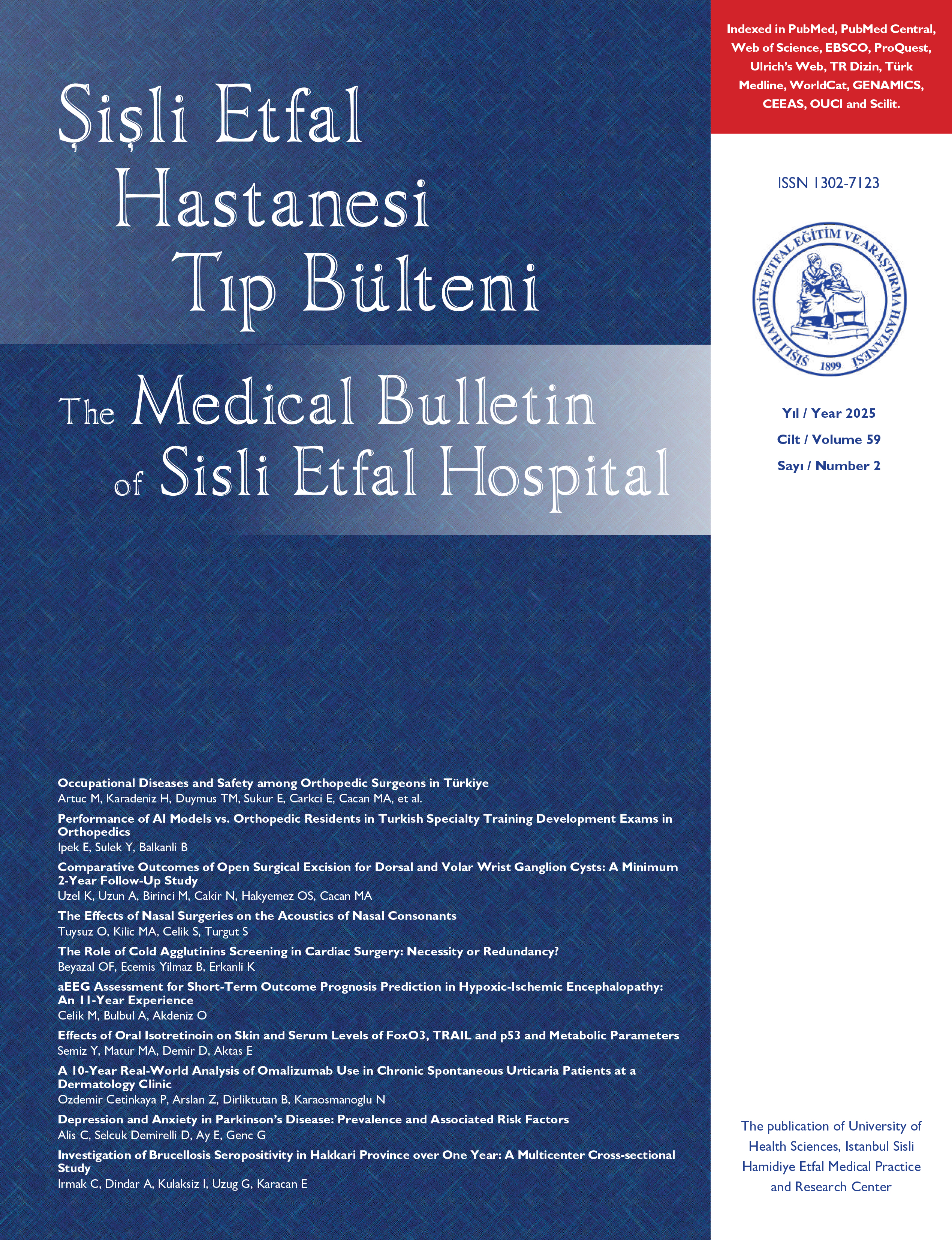
Preterm İnfantlarda Taburculukta ve Postnatal 6. Ayda Sadece Anne Sütü İle Beslenme Oranları ve Etki Eden Faktörler
Nursu Kara, Didem Arman, Ebru Ozcan, Adem Gul, Serdar ComertPediatri Anabilim Dalı, Neonatoloji Bölümü, Sağlık Bilimleri Üniversitesi, İstanbul Eğitim ve Araştırma Hastanesi, İstanbul, TürkiyeGiriş: Emzirme term ve preterm yenidoğanlar için en uygun beslenme şekli olarak kabul edilmektedir. Çalışmamızın amacı, hastanemiz yenidoğan yoğun bakım ünitesinde (YYBÜ) izlenen 34 gebelik haftasının (GH) altındaki bebeklerde taburculukta sadece anne sütü ile beslenme oranlarını araştırmak, taburculukta ve 6. ayda sadece anne sütü ile beslenmeyi etkileyen faktörleri incelemektir.
Gereç ve Yöntem: 0cak 2022-Haziran 2023 tarihleri arasında postnatal ilk 24 saat içinde hastanemiz yenidoğan yoğun bakım ünitesine yatan <34 GH yenidoğanların dosyaları geriye dönük olarak incelendi. Anne ve bebeklere ait demografik veriler, beslenme ile ilgili faktörler ve morbiditeler kaydedildi. Taburculuk sonrası riskli yenidoğan polikliniği izlem kayıtlarından sadece anne sütü ile beslenme süresi ve emzirmeye devam edilme durumu ile ilgili veriler elde edildi. Taburculukta emzirme oranı ve emzirmeyi etkileyen faktörler incelendi.
Bulgular: Çalışmaya dahil edilen 114 yenidoğanın %44,8 i kız ve %55,2 si erkekti. Ortalama gebelik haftası 29,8±2,6 hafta, ortalama doğum ağırlığı ise 1365±474 gram idi. Taburculukta sadece anne sütü ile beslenme oranı %57,8 iken, bu oranın 6. ayda %45,6ya düştüğü saptandı. Ortalama emzirme süresi 15,7±6,5 aydı. Annenin etnik kökeni ve dil bariyeri, taburculukta sadece anne sütü ile beslenmeyle istatistiksel olarak anlamlı şekilde ilişkili bulundu (p=0,04, p=0,05). Altıncı ayda sadece anne sütü ile beslenen bebeklerin gebelik haftaları anlamlı şekilde daha yüksek ve hastanede kalış süreleri daha kısaydı (p=0,029, p=0,02). Altıncı ayda sadece anne sütü ile beslenme, ekstrauterin büyüme kısıtlılığı (EUBK) sıklığında anlamlı bir azalma ile ilişkiliydi (p=0,04). Taburculukta sadece anne sütü ile beslenen bebeklerin %96,9u (n=64) ilk besin olarak anne sütü almıştı, bu oran taburculukta karışık beslenen bebeklerden anlamlı olarak yüksekti (p=0,005). Tam enteral beslenmeye ulaşma süresi de sadece anne sütü ile beslenen grupta anlamlı olarak daha kısaydı (p=0,017). Orogastrik/nazogastrik tüple beslenme süresi daha kısa olan bebeklerde 6. ayda sadece anne sütü ile beslenme oranı, karışık beslenen gruba kıyasla anlamlı olarak daha yüksekti (p=0,043).
Sonuç: Taburculukta ve 6. ayda sadece anne sütü ile beslenme oranlarını artırmak ve EUBK gelişimini azaltmak için prematüre bebeklerin doğumdan itibaren anne sütü ile beslenmesi özendirilmeli ve devamının sağlanması için YYBÜ de her koşulda anneye tam destek sağlanmalıdır.
The Exclusively Breastfeeding Rate and Related Factors Among Preterm Infants at Discharge and postnatal 6th Months of Age
Nursu Kara, Didem Arman, Ebru Ozcan, Adem Gul, Serdar ComertDepartment of pediatrics, Division of Neonatology, Health Sciences University, Istanbul Education and Research Hospital, Istanbul, TurkiyeObjectives: Breastfeeding is accepted to be the optimum nutrition for term and preterm newborns. The objective of our study was to investigate the rates of exclusive breastfeeding (EBF) at discharge among infants less than 34 weeks of gestation (GWs), followed up in neonatal intensive care unit (NICU) and to analyze the factors influencing EBF practices at discharge and 6th months of age.
Methods: In this study, we retrospectively evaluated the medical records of neonates <34 GWs admitted to NICU within the first postnatal 24 hours of life between January 2022 and June 2023. The maternal and neonatal demographic data and the related medical and nutritional factors, morbidities were recorded. Data regarding the duration of exclusive breastfeeding, and the maintenance of breastfeeding were retrieved from the follow-up records of the high-risk newborn outpatient clinic post-discharge. The rate of breastfeeding at discharge and the factors influencing breastfeeding practices were analyzed.
Results: The study cohort comprised 114 neonates, of whom 44.8% were female and 55.2% were male. The mean gestational age was 29.8±2.6 weeks and the mean birth weight was 1365±474 grams. The exclusive breastfeeding rate was 57.8% at discharge and declined to 45.6% at six months. The mean duration of breastfeeding was 15.7±6.5 months. Maternal ethnicity and the language barrier were found to be statistically significantly associated with exclusive breastfeeding at discharge, respectively (p=0.04, p=0.05). Infants who were exclusively breastfed at six months had significantly higher gestational age and shorter duration of hospital stay, respectively (p=0.029, p=0.02). Exclusive breastfeeding at six months was statistically significantly associated with a reduced incidence of extrauterine growth retardation (EUGR) (p=0.04). Among exclusively breastfed infants at discharge, 96.9% (n=64) received breast milk as their first feed, significantly more than mixed-fed infants (p=0.005). Time to reach full enteral feeding was also statistically significantly shorter in the exclusively breastfed group (p=0.017). Infants with a shorter duration of feeding via orogastric/nasogastric tube had a significantly higher rate of exclusive breastfeeding at six months compared to the mixed-fed group (p=0.043).
Conclusion: To improve exclusive breastfeeding rates at discharge and six months postnatally, and to reduce the incidence of EUGR, feeding preterm infants with their mothers own milk from birth should be actively promoted. In addition, comprehensive and consistent maternal support should be provided in the NICU to facilitate both the initiation and continuation of breastfeeding under all circumstances from birth. (SETB-2025-04-084)
Makale Dili: İngilizce



















